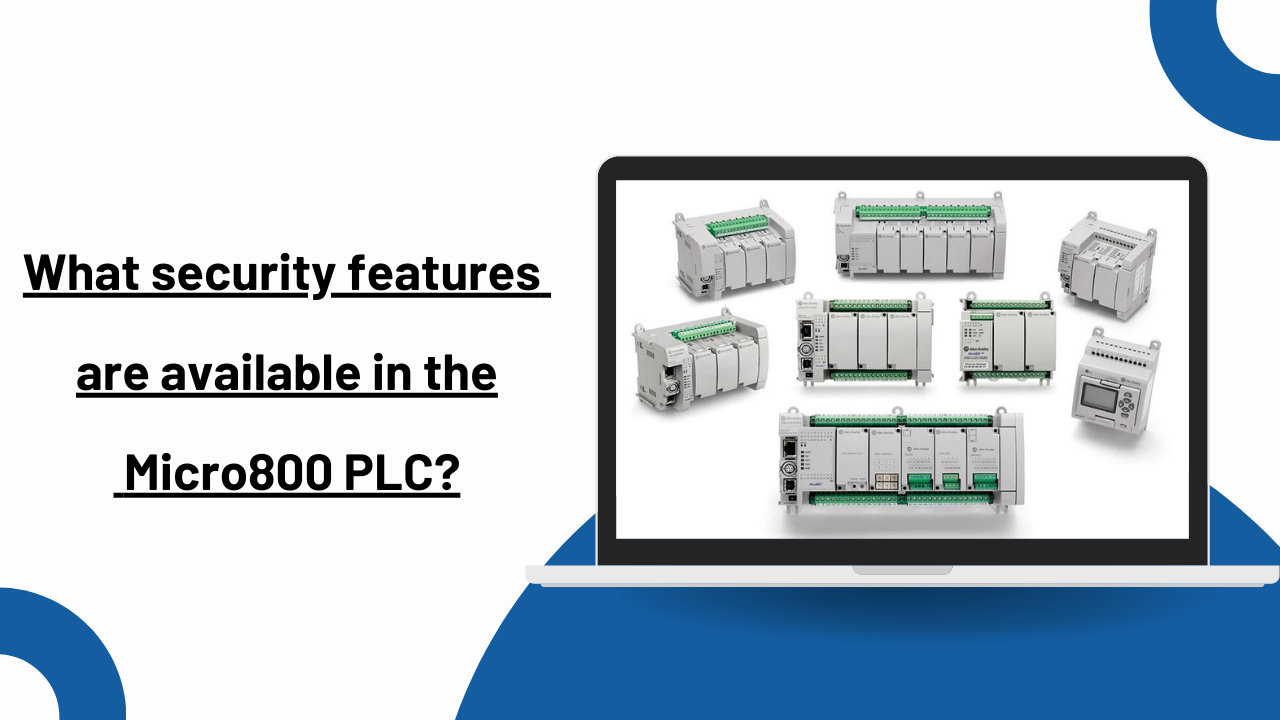A number of strong security features are built into the Rockwell Automation Micro800 PLC series to guarantee the confidentiality and integrity of industrial control systems. The security of programmable logic controllers (PLCs) in industrial settings is an increasing concern, and these security measures are intended to guard against potential cyber-attacks and unauthorized access.
1. User Authentication: User authentication procedures are commonly supported by Allen Bradley Micro800 PLCs to regulate access to the programming environment and configuration settings. Different levels of access may be available to users depending on their roles and permissions.
Multiple user accounts, each with a different username and password, can be created with PLCs. Users’ responsibilities determine the roles or access levels they are assigned.
Users are granted different rights based on their access levels. A user with read-only access can only view the program; on the other hand, an administrator may have complete control over configuring and altering the program.
The specifications for crafting secure passwords are outlined in password policies. To improve security, this can entail a minimum length, the usage of unusual characters, and frequent password expiration.
2. Password Protection: In order to prevent unauthorized access to PLC programs and setups, password protection is frequently used. Entering a working password is necessary for users to log in and make changes.
PLCs often allow users to set passwords for varying levels of access. Passwords for programming, configuration, and other privileged procedures may fall under this category. When trying to carry out protected tasks, users might have to input the password.
To make sure that passwords are strong enough, PLCs frequently impose requirements on password strength. Enforcing minimum length requirements and demanding a combination of uppercase, lowercase, numerals, and special characters may be necessary to achieve this.
3. Role-Based Access Control (RBAC): According to the RBAC security model, users are given roles with corresponding set of permissions. This makes it possible to control the PLC programming environment’s permissions for specific tasks more precisely.
4. Audit Trails: Rockwell Automation Micro800 PLCs might have audit trails, which record and monitor system modifications. This function aids in keeping an eye on and spotting any accidental or illegal changes made to the PLC programs
Program uploads and downloads, configuration changes, user logins, and other important system events are all recorded in a log that PLCs keep track of. Most logged events have a timestamp attached to them.
User activity is frequently recorded in audit trails, which show who accessed the PLC, when they logged in, and what they did. For the purpose of accountability and security monitoring, this data is invaluable.
5. Communication Security: Protocols for secure communication can be used to safeguard information sent between the PLC and other networked devices. This aids in guarding against manipulation or unwanted access when exchanging data.
When communicating with the PLC over a network, use secure communication methods like SSH (Secure Shell) or HTTPS (Hypertext Transfer Protocol Secure). These protocols protect against illegal access and eavesdropping by encrypting data while it is in transit.
By putting VPNs into place, remote PLC access is made even more secure. VPNs safeguard communication between the user and the PLC by building an encrypted, secure tunnel over the internet.
6. Firmware Integrity Checks: The PLC might have features to check the firmware’s integrity. By ensuring that the PLC is operating with the original, unaltered firmware, this helps guard against possible security risks.
Firmware file integrity is frequently checked using checksums and cryptographic hash algorithms (like SHA-256). Genuine firmware files frequently come with checksums or hash values provided by the manufacturer. Users can verify file integrity by computing the file’s checksum or hash and comparing it to the value supplied by the manufacturer prior to executing firmware upgrades.
A feature known as “secure boot” makes that the PLC can only load and run software that has been properly signed and authorized. This stops altered or unauthorized firmware from being executed during the boot process.
To find any illegal changes, do routine integrity checks on the PLC firmware. This should involve comparing checksums, hashes, or digital signatures with known good values and can be a part of regular maintenance activities.
7. Firewall and Network Security: Micro800 PLCs may benefit from the installation of firewalls and other network security measures in a networked environment to guard against unwanted access and potential external assaults.
Install firewalls made for industrial use that are specifically made for control systems. These firewalls are designed to meet the particular needs and difficulties found in industrial settings.
To isolate various components of the industrial network, including PLCs, use network segmentation. Segmentation restricts the lateral flow of threats within the network and aids in the containment of possible security events.
To specify and enforce which devices or users are permitted to communicate with the PLCs, utilize access control lists. ACLs assist in limiting access according to protocols, ports, and IP addresses.
User authentication, role-based access control, audit trails, network security measures, encryption, firmware integrity checking, physical security features, secure communication protocols, and the option to disable unused services are examples of common security features found in PLCs, including those in the Micro800 series. Protecting the security and integrity of industrial automation systems requires these features.

